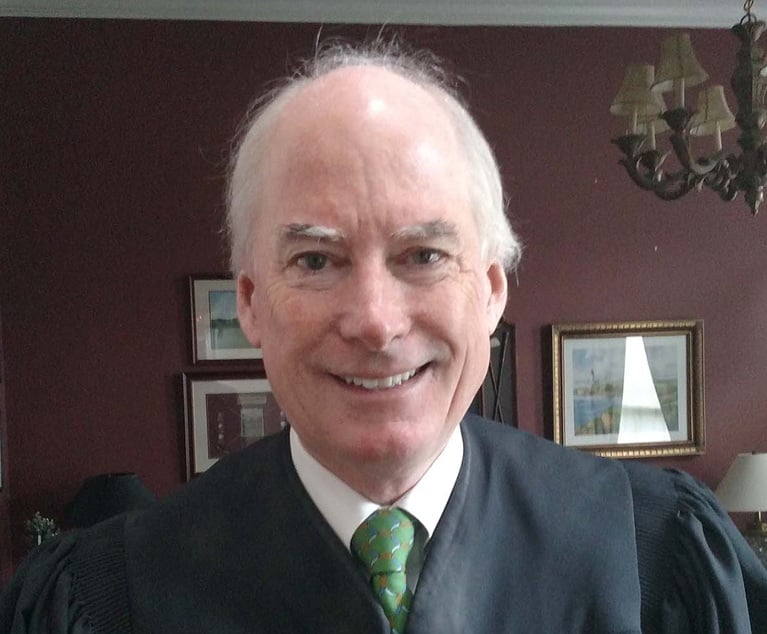 Photo: Shutterstock.com
Photo: Shutterstock.comAttorneys Who Steal: Repeat Offenders Often Have 1 Thing in Common
"Life hits you," said defense counsel James R. Hardy II. "And sometimes it's hard for some people to get a grip, or to get a hold of what it is that's affecting them."
September 19, 2019 at 09:35 PM
6 minute read
A review of attorney ethics cases spanning five years shows two types of repeat offenders: those who have recurring disciplinary cases stemming from a lack of diligence and communication.
And those who steal.
|Attorneys With Multiple Money-Related Ethics Cases
|- Craig Larsen was first disbarred in 2012 for a year and a day for stealing from a client, then disbarred again in 2016 for the same thing—this time losing his license for 20 years. His sentence included 24 months in prison, and an order to pay restitution for stealing $200,000 from a client. Federal public defender Kelly M. Barrett represented Larsen, and did not respond to a request for comment.
- New Jersey lawyer Alfred Cali, who practiced in Bridgeport, was accused of stealing almost $10,000 from a client in a bankruptcy and foreclosure case. He pleaded guilty under the Alford, or best-interests, plea, and has accumulated another charge for failing to appear in court.
Lawyers in the first group have little in common. Their cases range from failing to update a client about their case to sending a client cryptic or unintelligible text messages, according to a Connecticut Law Tribune study of attorney discipline cases before the Office of Chief Disciplinary Counsel from January 2014 to August 2019.
But those facing theft charges often share a common trait: a slew of allegations that seemed to escalate to more serious offenses.
Former Bristol lawyer Jodi Nils Gagne, for instance, was suspended for alleged billing violations, before she was disbarred and convicted of stealing money from elderly clients. Her attorney, Francis O'Reilly, declined to comment.
And Waterbury lawyer Alan Giacomi collected multiple grievance complaints—at least 16—landing him one suspension in 2017 and another in 2019 over misappropriation of funds. By the time Connecticut's grievance committee handed him a 20-year suspension in July, Giacomi helped funnel more than $400,000 from clients in real estate transactions. He was sentenced to 41 months in prison and three years of supervised release.
 Click here to read special report
Click here to read special report
James R. Hardy II of the Hardy Law Group in Stratford handled Giacomi's grievance cases, and viewed his client's skills as separate and apart from his mistakes. Giacomi struggled with a drug addiction, according to Hardy, who described him as "one of the best lawyers I've actually had the pleasure of meeting."
"He's a very brilliant, very intelligent man," Hardy said. "But I want it to be known that sometimes, it doesn't matter what your status is in life. Life hits you. And sometimes it's hard for some people to get a grip or to get a hold of what it is that's affecting them, and sometimes it's difficult for them to reach out for help. That, in turn, is where the damage comes in."
The way Hardy sees it, an attorney isn't necessarily the sum of his grievance complaints, since any client can file one.
"Some clients are easier to deal with than others, and the ones that are a bit more in tune and take more of an intimate approach to their case, if things don't go the way they would like for them to go, will be quick to file a complaint with the statewide grievance committee," Hardy said. "But what I would say is any time a client makes a claim and the claim is about money, it is to be taken seriously and there's an extreme amount of merit to it."
|Downward spiral
When it comes to misappropriation of funds, punishment is not an effective deterrent, according to Suzanne Sutton of Cohen & Wolf's Orange office.
Sutton now represents attorneys faced with grievance complaints and malpractice claims, but earlier in her career, she served nine years with Connecticut's Office of the Chief Disciplinary Counsel.
"I think if you're going to steal money, you're going to steal money, and I think attorney discipline is probably the least of your problems," she said.
Most repeat offenders are attorneys accused of taking money from clients, without doing any work in exchange, according to Sutton.
In these cases, punishment can be an effective deterrent for some, and the grievance committee's main goals is to educate lawyers who've broken ethics rules, in hopes they won't repeat the violation. As a result, many first-offense sanctions are tied to the condition that lawyers complete continuing legal education courses.
Connecticut Practice Book Section 2-47(d)(1) has a "three strikes in five years" rule designed to curb serial violations. It requires attorneys with three or more probable-cause findings within a five-year period to be presented before the Superior Court, where a judge will decide on the next move.
"Even if that fourth violation might not be a significant violation, the fact that you've had four violations within the last five years means that you're a repeat offender that we need to take a special look at," Sutton said.
But these measures don't stop everyone.
Financial wrongdoing, such as misappropriation, often starts small. It's often a slippery slope that results in a loss of control, according to ethics lawyer Mark Dubois, Connecticut's first chief disciplinary counsel.
Violators often aren't thinking about long-term fallout, Dubois said.
"It's Friday afternoon. They've got to make a payroll, or they've got to pay the light bill. They don't have money but they know they've got money coming in next week from a closing or new client or something. So they borrow a little money, and they put it back," he said. "And then a few months later they borrow a little more, and it takes them a little longer to put it back. Then it becomes a downward spiral. They wind up borrowing more and more and keeping it for longer and longer, and eventually something comes along, either they start bouncing checks or there's a random audit."
Hartford lawyer Wayne A. Francis appears to have fallen into that spiral, receiving about 19 grievance complaints between 2016 and 2019, before allegedly stealing more than $200,000 and becoming a fugitive that police found hiding in a Manchester hotel.
Illustration by David Palmer.
Related stories:
This content has been archived. It is available through our partners, LexisNexis® and Bloomberg Law.
To view this content, please continue to their sites.
Not a Lexis Subscriber?
Subscribe Now
Not a Bloomberg Law Subscriber?
Subscribe Now
NOT FOR REPRINT
© 2025 ALM Global, LLC, All Rights Reserved. Request academic re-use from www.copyright.com. All other uses, submit a request to [email protected]. For more information visit Asset & Logo Licensing.
You Might Like
View All
Lessons in Mediation & Negotiation: Attorneys' Reflections on Jimmy Carter

Managing Partner Vindicated in Disciplinary Proceeding Brought by Former Associate
5 minute read
2nd Circuit Revives Connecticut Lawyers' Challenge to Anti-Discrimination Ethics Rule

Trending Stories
- 1'True Leadership Is About Putting Others First': 2024 In-House Award Winners Inspired, Took Road Less Traveled
- 2A Q&A with Sidley Austin's London Leader
- 3New York-Based Harris Beach Combines With Connecticut-Based Murtha Cullina, Forming NE Powerhouse
- 4New Year, New Am Law 100: Challenges Await These Newly Merged Law Firms
- 5Thursday Newspaper
Who Got The Work
Michael G. Bongiorno, Andrew Scott Dulberg and Elizabeth E. Driscoll from Wilmer Cutler Pickering Hale and Dorr have stepped in to represent Symbotic Inc., an A.I.-enabled technology platform that focuses on increasing supply chain efficiency, and other defendants in a pending shareholder derivative lawsuit. The case, filed Oct. 2 in Massachusetts District Court by the Brown Law Firm on behalf of Stephen Austen, accuses certain officers and directors of misleading investors in regard to Symbotic's potential for margin growth by failing to disclose that the company was not equipped to timely deploy its systems or manage expenses through project delays. The case, assigned to U.S. District Judge Nathaniel M. Gorton, is 1:24-cv-12522, Austen v. Cohen et al.
Who Got The Work
Edmund Polubinski and Marie Killmond of Davis Polk & Wardwell have entered appearances for data platform software development company MongoDB and other defendants in a pending shareholder derivative lawsuit. The action, filed Oct. 7 in New York Southern District Court by the Brown Law Firm, accuses the company's directors and/or officers of falsely expressing confidence in the company’s restructuring of its sales incentive plan and downplaying the severity of decreases in its upfront commitments. The case is 1:24-cv-07594, Roy v. Ittycheria et al.
Who Got The Work
Amy O. Bruchs and Kurt F. Ellison of Michael Best & Friedrich have entered appearances for Epic Systems Corp. in a pending employment discrimination lawsuit. The suit was filed Sept. 7 in Wisconsin Western District Court by Levine Eisberner LLC and Siri & Glimstad on behalf of a project manager who claims that he was wrongfully terminated after applying for a religious exemption to the defendant's COVID-19 vaccine mandate. The case, assigned to U.S. Magistrate Judge Anita Marie Boor, is 3:24-cv-00630, Secker, Nathan v. Epic Systems Corporation.
Who Got The Work
David X. Sullivan, Thomas J. Finn and Gregory A. Hall from McCarter & English have entered appearances for Sunrun Installation Services in a pending civil rights lawsuit. The complaint was filed Sept. 4 in Connecticut District Court by attorney Robert M. Berke on behalf of former employee George Edward Steins, who was arrested and charged with employing an unregistered home improvement salesperson. The complaint alleges that had Sunrun informed the Connecticut Department of Consumer Protection that the plaintiff's employment had ended in 2017 and that he no longer held Sunrun's home improvement contractor license, he would not have been hit with charges, which were dismissed in May 2024. The case, assigned to U.S. District Judge Jeffrey A. Meyer, is 3:24-cv-01423, Steins v. Sunrun, Inc. et al.
Who Got The Work
Greenberg Traurig shareholder Joshua L. Raskin has entered an appearance for boohoo.com UK Ltd. in a pending patent infringement lawsuit. The suit, filed Sept. 3 in Texas Eastern District Court by Rozier Hardt McDonough on behalf of Alto Dynamics, asserts five patents related to an online shopping platform. The case, assigned to U.S. District Judge Rodney Gilstrap, is 2:24-cv-00719, Alto Dynamics, LLC v. boohoo.com UK Limited.
Featured Firms
Law Offices of Gary Martin Hays & Associates, P.C.
(470) 294-1674
Law Offices of Mark E. Salomone
(857) 444-6468
Smith & Hassler
(713) 739-1250










